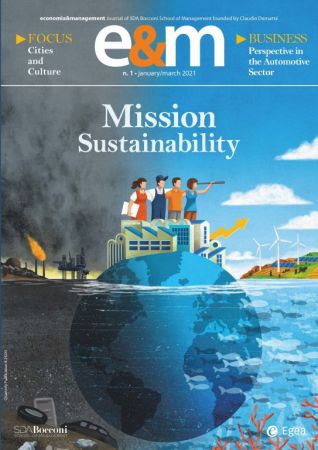E&M
2021/1
What Cities for Culture, What Culture for Cities of Tomorrow
The goal of this Focus is to reflect on the nature, quality, and value of the relationship between the world of cultural organizations and cities, but also on how these factors, in this strange present, can change to become a virtuous engine of economic-social rebirth.
The goal of this Focus is to reflect on the nature, quality, and value of the relationship between the world of cultural organizations and cities, but also on how these factors, in this strange present, can change to become a virtuous engine of economic-social rebirth.
The Focus starts from the consciousness of the centrality of cities and the conviction that cultural organizations are fundamental actors to construct a solid social fabric and support processes of sustainable growth at the urban level. The underlying hypothesis is that both the economy of cities and their quality of life have much to gain from a closer dialogue with the cultural organizations that operate within them. In that sense, it is necessary to overcome the logic of "rescue" and "relief," asking cultural subjects to act in a constructive and entrepreneurial way, thus helping to carefully redesign relations within an urban space with a spirit of solidarity. The other underlying hypothesis is that there are cultural organizations that have understood that our times require a "change in posture," activating innovative and transformational behavior in the way activities are carried out. To them we owe our attention, gratitude, and support.
Maintaining the quality of urban life regards all of us. It regards the public administration, called on to make an effort to redistribute resources and combat the growth of inequalities accentuated by the pandemic and a management of the emergency that includes mobility and basic services for citizens, starting with health care and education; it regards economic actors, heavily taxed by the overall slowdown of activity, and who can only gain from a social and economic fabric that does not break down, an indispensible premise to return to being attractive; it regards families, whose lifestyles have changed deeply and for whom the choice of where to live (when the possibility to choose exists) will increasingly be conditioned by multiple factors, including the possibility to find local services that are able to satisfy emerging needs.
Over the course of recent years, some cities have deliberately stressed the importance of cultural organizations and cultural production and distribution chains as elements that characterize the urban fabric, as drivers of economic development, and as identity pillars of inhabitants' socio-cultural growth. Since culture defines people's relationship with time, space, and other people, all cities – as densely-inhabited areas characterized by numerous, complex, and frequent relations – are "cultural" by definition. However, when we speak of art cities, UNESCO sites, creative cities or networks of cities constructed "around culture" (from the World Culture City Network to the United Cities and Local Governments network), we find a specific political will, as well as the recognition of geographically concentrated sectoral clusters and the role of specific actors (public, private, and non-profit) that converge around the idea that culture can be a resource for a local territory, and as such can and must be promoted in the interest of many.





